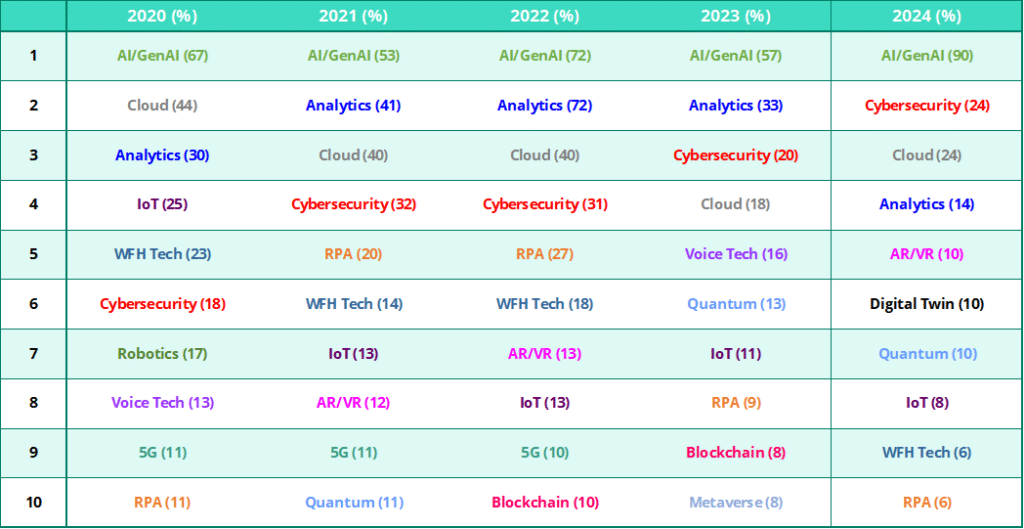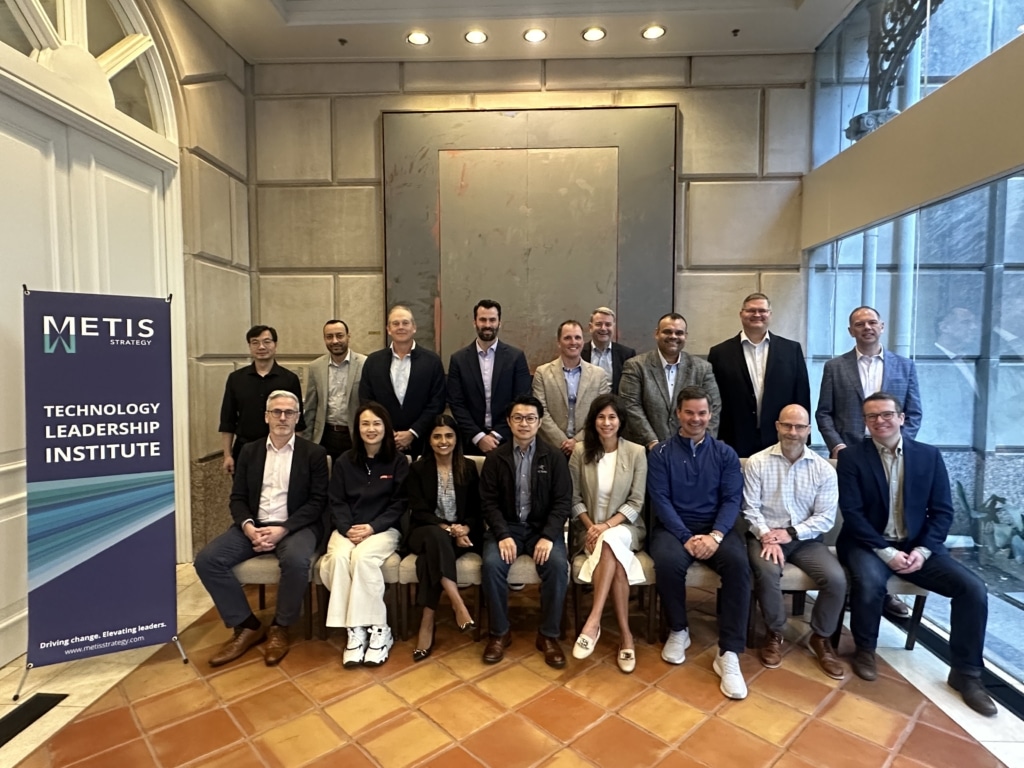- Articles
- December 23, 2024
- 4 Minute Read
Artificial intelligence (AI) has transitioned from a novelty to a cornerstone of modern business, driving productivity, enhancing customer engagement, and enabling operational innovation. Yet, as its influence expands, so do the complexities and risks associated with its adoption.
On the Technovation with Peter High podcast this year, technology and digital leaders across industries once again noted AI and generative AI as the topic occupying much of their time. Conversations in 2024 frequently explored the transformative potential of AI while addressing the hurdles that come with scaling it responsibly. As we look ahead to 2025, technology leaders continue to seek out the opportunities AI can unlock while adopting the appropriate guardrails and governance frameworks needed to to adopt it effectively.
AI Begins to Drive Enterprise Results
AI has emerged as a game-changer across industries, enabling hyper-personalized customer experiences, enhancing operational efficiency, and powering innovation across a range of business functions. Sanjay Bhakta, Chief Product and Technology Officer at Condé Nast, highlights how AI is transforming user engagement: “We are now starting to also think about how we use our first-party data to provide a better experience to our users, whether it’s personalized newsletters, personalized recommendations, and a very personalized experience as you come to our site.”
Generative AI applications are also reshaping operations and customer service. Shankar Arumugavelu, Executive Vice President of Verizon Global Services, notes: “We’ve rolled out a generative AI-powered research assistant to over 40,000 agents globally, reducing hold times by 20% and enabling faster resolutions for customer queries.” These applications illustrate why AI/GenAI continues to top the trends chart, with 90% of the episodes mentioning it as a significant trend.
Emerging technologies are also gaining traction alongside AI. Digital twins, for instance, were mentioned so frequently this year that they earned a dedicated category in the trends chart. Bala Subramanian, Chief Digital and Technology Officer of UPS, shares how digital twins are optimizing logistics: “We’re making significant investments in creating a digital twin of our network. This allows us to adapt to specific needs like temperature control for vaccines versus other products.” Similarly, AR/VR saw a notable rise in mentions, suggesting it’s further adoption in the enterprise. As CIO of Hensel Phelps Dolores Mears notes: “The ability to take a 3D drawing, get it in front of you on goggles, and see the ‘as-built’ in a facility allows us to walk job sites in real-time and catch errors before they cause rework.”
AI’s integration with advanced data analytics is another key trend. James Ross, CIO of Danaher, emphasizes, “The amount of data that we’re producing is growing, and the need to mine it and use data and analytics and AI to generate insights is going to be more and more critical.”
Scaling AI Further Comes with New Demands, Challenges
Despite its promise, scaling AI requires significant investments in infrastructure, data, governance, and workforce training. As Satya Jayadev, CIO of Skyworks, points out: “It’s one thing to put AI systems together; it’s a whole different ballgame to sustain them.” Governance frameworks and clean data are crucial to ensuring AI initiatives deliver their intended value.
Scaling AI effectively also requires businesses to address operational and infrastructure challenges. Prasanna Gopalakrishnan, now the Global Chief Product and AI Officer at ADP, shared during her time as Global CTO at Sky: “We need faster computing power to crunch the enormous datasets being created. Processing data closer to where it’s needed, through edge computing, is critical to solving these challenges.” As the scale and complexity of AI models continue to grow, quantum computing is increasingly seen as a necessary innovation to meet the demand for advanced computational power.
Cybersecurity, which continues to rise as a key focus area on the trends chart, also remains a top concern tied to these advancements. Jason Strle, CIO at Discover Financial, highlights the evolving threat landscape and the implications of quantum computing, noting that it “is going to reset how we think about encryption.” This underscores the urgent need for proactive defenses and a clear strategy to maintain enterprise resilience as these emerging technologies take hold.
Ethical considerations remain a cornerstone of AI adoption. Tilak Mandadi, Chief Data, Digital and Technology Officer of CVS, stresses the critical need for responsible AI: “Applied responsibly, AI has the power to transform industries while minimizing human errors. Without guardrails, the risks outweigh the rewards.” This aligns with a broader industry trend, as companies increasingly adopt ethical AI frameworks and establish internal councils to mitigate risk and guide effective implementation.
Finally, upskilling internal talent is critical to scaling AI effectively. Tim Dickson, CIDO of Regal Rexnord, shares how his organization is equipping its workforce: “We’ve trained over 100 team members in generative AI fundamentals. Upskilling is critical because internal teams understand our business and regulatory challenges, making them better equipped to manage risks.”
This year’s trends highlight AI’s expanding influence across sectors, with technologies like cybersecurity, AR/VR, and digital twins continuing to rise in prominence. These tools are increasingly viewed as essential complements to an AI-led operating model, enabling organizations to unlock the full potential of AI-driven innovation. As leaders on Technovation consistently emphasize, success with AI in 2025 and beyond will depend on how effectively organizations balance innovation with responsibility, ensuring that AI’s transformative power is harnessed sustainably and securely.



